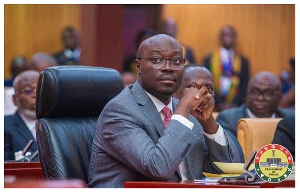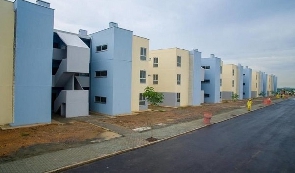in spite of falling rates in Treasury Bills
Abetifi(E/R), Sept. 21, GNA - The Odwen Anoma Rural Bank, based at Abetifi in the Kwahu South District, has recorded a pre-tax profit of 309.955 million cedis last year, as against 293.151 million cedis in the previous year, despite the falling rate in Treasury Bills.
Over the years, the Bills had been found to be the main source of "windfall" income for the rural banks but due to the government's recent prudential economic policies, the yield from this investment was becoming uncompetitive.
While the Bank's total assets appreciated by 62 per cent from 4.3 billion cedis in 2001 to 7 billion cedis last year, the banks' total deposits also increased by 65 percent, from 3.6 billion cedis to 5.9 billion cedis and its share capital went up from 468.216 million cedis to 674.5 million cedis, an increase of 44 percent.
This was announced by the chairman of the Board of Directors of the Bank, Mr. Emmanuel Kwame Ofori, at the 7th Annual General Meeting (AGM) of the Bank at Abetifi on Saturday.
He said during the two years under review, the bank increased its investment from 1.5 billion cedis to 3.8 billion cedis as at the end of the year 2002, representing an increase of 64 percent, while it also granted advances to the tune of 4.8 billion cedis to its customers.
Mr Ofori noted that the Board took advantage of every business opportunity created by the Ghanaian economy and the current competitive climate in the financial sector to ensure that the strategies adopted enhanced the bank's position and maximise shareholders' fund.
This, he said, led the bank to spend 118.5 million cedis to pay a dividend of ten cedis per share last year as against three cedis per share the previous year which were converted to bonus share.
He said the bank spent 16 million cedis last year on educational projects as well as to finance other social needs in a number of communities in its catchment areas.
The District Chief Executive (DCE), Mr Raymond Osafo-Djan said since the concept of rural banking was developed as an instrument of micro credit delivery to transform the rural economies and raise the living standards of the people, the rural banks should endeavour to keep faith with the primary objectives for which they were established.
He urged the rural banks in the district to open agencies at the marketing centres which the Assembly was constructing to enable traders make use of the Apex Link programme to save them from armed robbers who normally attacked and robbed them on their way to market centres. The DCE said due to the bank's good performance, the Assembly had channelled 300 million cedis of its Poverty Alleviation Fund loans through its agencies at Nkawkaw and Abetifi for a number of applicants in those two areas.
The Omanhene of the Kwahu Traditional Area, Daasebre Akuamoa Boateng, II, who chaired the function, urged rural banks to give financial assistance to farmers and teachers since the banks were set up to assist the rural people.
He advised customers who had been granted loans by the bank to pay up for others to benefit to ensure the sustenance of the bank and also urged shareholders to increase their share capital to 200 thousand cedis.
















